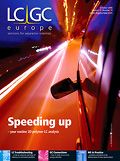Readers' choice
Bio-Rad Laboratories' Informatics Division has received a gold award for its KnowItAll Informatics System spectroscopy software and a silver award for its KnowItAll Cheminformatics Edition. The company was chosen by readers of Scientific Computing in the 2006 Readers' Choice Awards.
Bio-Rad Laboratories' Informatics Division has received a gold award for its KnowItAll Informatics System spectroscopy software and a silver award for its KnowItAll Cheminformatics Edition. The company was chosen by readers of Scientific Computing in the 2006 Readers' Choice Awards.
The awards are held annually by Scientific Computing and the readers select favourite products in a number of different categories based on quality, reliability, ease-of-use, technical support and value. The company has been recognized for its products in the spectroscopy software category for nine consecutive years.
The company's KnowItAll Informatics System is a fully integrated software and database package for multiple spectroscopic techniques, with tools for database building, management, search, analysis, prediction, reporting and spectral reference databases within a single user interface. Additionally, the software offers a series of solutions for chemistry, chemometrics, ADME/Tox and metabolomics. The Cheminformatics Edition is a complete unified system used to draw, modify, store, search and retrieve chemical structures and other information.

For more information visit the company's website at www.bio-rad.com
Collaborative agreement
Cohesive Technologies has announced that it has entered into a collaborative agreement with Mayo Clinic to increase patient sample throughput and improve data quality. The turbulent flow chromatography (TurboFlow technology) systems from Cohesive will be employed for clinical assays using tandem mass spectrometry (MS–MS).
This collaboration is aimed at accelerating the development of clinical assays in areas including endocrinology, toxicology, drug monitoring and neonatal screening. The companies will share in the development of the TurboFlow and mass spectrometry methods to improve the quality and efficiency in diagnostics for adults, children and newborns.
For more information visit Cohesive's website at www.cohesivetech.com
Joint venture
The Pittsburgh Conference on Analytical Chemistry and Applied Spectroscopy has announced that the ACS Division of Analytical Chemistry (DAC) will host four invited symposia, four contributed sessions and an undergraduate poster session at Pittcon 2007. This venture is an experimental one-year trial and is expected to benefit all the parties concerned.
In 2007, the ACS meeting and Pittcon will be held within three weeks of each other in Chicago (Illinois, USA) as the DAC committee has decided that this would be a good time to partner up. The DAC executive committee believes that its members would be better served if the DAC hosted sessions at Pittcon instead of the 233rd ACS National Meeting and Exposition.
Pittcon's publicity chairman, Adrian Michael, stated, "The benefit of this partnership is it will allow analytical chemists to attend Pittcon and the ASC-DAC Meeting at once."
For more information visit the organization's website at www.pittcon.org
German publication for separation scientists
In response to demand from German-speaking readers of LCGC Europe a German publication will be launched this month. LCGC Ausgabe in deutscher Sprache (LCGC AdS) will be an electronic magazine featuring the same turning-page format as seen in The Column. It will be published entirely in German on a quarterly basis and distributed to 6000 German-speaking separation scientists in Germany, Austria and Switzerland.

Editorial content will feature application-based technical articles that have not previously been published in LCGC Europe as well as translated popular columns, such as "LC Troubleshooting", "GC Connections" and "Sample Preparation Perspectives". The launch focuses on sample preparation and liquid chromatography–mass spectrometry.
If you would like to subscribe to LCGC AdS please visit the website at www.lcgcads.de
Measuring Vitamin K1 Concentrations in Dogs with Chronic Enteropathy Using LC–MS/MS
May 14th 2025A joint study between the University of Tennessee (Knoxville, Tennessee) and the University of Pennsylvania School of Veterinary Medicine (Philadelphia, Pennsylvania) compared directly measured vitamin K1 (vitK1) concentrations in healthy dogs and dogs with chronic enteropathy (CE) using liquid chromatography tandem mass spectrometry (LC–MS/MS); they also investigated whether supplementation of vitK1 in dogs with CE would significantly increase vitK1 concentrations.
HPLC 2025 Preview: Fundamentally Speaking (Part 2)
May 14th 2025Michael Lämmerhofer from the Institute of Pharmaceutical Sciences, University of Tübingen, Germany, spoke to JFK Huber Lecture Award winner of 2024 Torgny Fornstedt, professor in analytical chemistry and leader of the Fundamental Separation Science Group, Karlstad University, Sweden, about his pioneering work in high performance liquid chromatography (HPLC) with a focus on fundamentals, ion-pair chromatography, and oligonucleotide applications.

.png&w=3840&q=75)

.png&w=3840&q=75)



.png&w=3840&q=75)



.png&w=3840&q=75)











